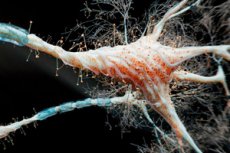New publications
New genetic variant may protect against Alzheimer's disease
Last reviewed: 29.06.2025

All iLive content is medically reviewed or fact checked to ensure as much factual accuracy as possible.
We have strict sourcing guidelines and only link to reputable media sites, academic research institutions and, whenever possible, medically peer reviewed studies. Note that the numbers in parentheses ([1], [2], etc.) are clickable links to these studies.
If you feel that any of our content is inaccurate, out-of-date, or otherwise questionable, please select it and press Ctrl + Enter.

Researchers are still unclear about what actually causes Alzheimer's disease, a type of dementia that affects about 32 million people worldwide.
However, they know that genetics plays a role, particularly certain genetic variants that involve a mutation or change in the DNA of a gene that causes it to act differently.
Finding and studying genetic variants in Alzheimer's disease is currently a major area of research. For example, scientists have found that genetic variants in the APOE and myeloid cell 2 (TREM2) gene may be associated with alzheimer's disease.
And a Trusted Source study published in March 2024 identified 17 genetic variants associated with Alzheimer's disease in five genomic regions.
Now scientists from the Vagelos College of Physicians and Surgeons at Columbia University in New York have identified a previously unknown genetic variant that helps protect against Alzheimer's disease, reducing a person's chance of developing the disease by up to 71%.
What role does fibronectin play in brain health?
In this study, scientists focused on a variant found in a gene that expresses fibronectin. Fibronectin is an adhesive glycoprotein that can be found on the surface of cells and in the blood and helps perform certain cellular functions.
Fibronectin can also be found in the blood-brain barrier, where it helps control what goes in and out of the brain.
Previous studies show that people with Alzheimer's disease have higher concentrations of fibronectin in their blood compared to those without.
Researchers believe that people with a mutation in the fibronectin gene are protected from Alzheimer's disease because it helps stop too much fibronectin from accumulating in the blood-brain barrier.
"These results gave us the idea that therapies targeting fibronectin and mimicking the protective variant may provide robust protection against this disease in humans," study co-principal investigator Richard Mayeux, M.D., Ph.D., chair of the Department of Neurology and the Gertrude H. Sergievsky, Psychiatry and Epidemiology at Columbia University, the press release noted.
"We may have to start clearing amyloid much earlier, and we think this can be done through the bloodstream," he suggested. "That's why we're very excited about the discovery of this variant of fibronectin, which could be a good target for drug development."
Gene variant linked to 71% reduction in Alzheimer's disease risk
The researchers also found that a variant of the protective fibronectin gene was found in people who never developed symptoms of Alzheimer's disease, although they inherited the e4 form of the APOE gene, which previous studies have shown significantly increases a person's risk of developing the disease.
Scientists analyzed genetic data from several hundred people over the age of 70 who were also carriers of a variant of the APOEe4 gene. The study participants were from different ethnic groups and some had Alzheimer's disease.
Combining the results of their study with replicated studies conducted at Stanford University and Washington University, the scientist found that the fibronectin gene variant reduced the risk of Alzheimer's disease by 71% in people carrying the APOEe4 gene variant.
In the same press release quoted above, Kagan Kizil, PhD, associate professor of neurological sciences at Columbia University's Vagelos College of Physicians and Surgeons and one of the study's leaders, explained:
"Alzheimer's disease may start with amyloid deposits in the brain, but the manifestations of the disease are the result of changes that occur after the deposits appear. Our results show that some of these changes occur in the brain's vascular network and that we will be able to develop new therapies that mimic the protective effect of the gene to prevent or treat the disease."
"There is a significant difference in fibronectin levels in the blood-brain barrier between cognitively healthy people and people with Alzheimer's disease, regardless of their APOEe4 status," Kizil added.
"Anything that reduces excess fibronectin should provide some protection, and a drug that does that could be a significant step forward in the fight against this debilitating disease," he suggested.
The results could eventually lead to new treatments for Alzheimer's disease.
The study was published in journal Acta Neuropathologica.
